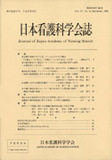Japanese
English
- 販売していません
- Abstract 文献概要
- 参考文献 Reference
- サイト内被引用 Cited by
要旨
静岡県西部に位置するH市の在宅要介護高齢者の女性介護者49人を対象に,ライフスタイルと疲労感に対する介護時間の影響を検討した.ライフスタイルの把握にはBreslowの生活習慣に関する7項目を,疲労感には蓄積的疲労徴候調査票(CFSI)を用いた.解析は介護時間により「24時間群」13人,「中時間群」12人,「4時間未満群」24人の3群に分け以下の結果を得た.
1.介護者のHPI得点(7点満点)は平均5.0±1.2点であり,介護時間による統計学的有意差は見られなかった.しかし,「24時間群」の介護者の得点が最も低く,特に睡眠および栄養のバランスに関して望ましい習慣の介護者が他の群に比べ少ない傾向であった.
2.介護者のCFSIは「24時間群」の介護者が「4時間未満群」の介護者に比べ,「身体不調」「慢性疲労」「抑うつ感」特性で有意に疲労感が高かった(p<0.05).
3.介護者のHPIとCFSIとの関連は,「4時間未満群」の介護者のみ,HPI得点と「慢性疲労」特性に有意に負の相関が見られた(p<0.05).
Abstract
The effects of the amount of time spent providing care to the elderly on caregivers' lifestyles and fatigue levels were examined. The subjects were 49 females administering in-home care to the elderly in H city located in the western part of Shizuoka prefecture. The caregivers' lifestyles were surveyed in terms of seven items from Breslow's Health Practice Index (HPI), and the caregivers' fatigue levels were assessed based on the Cumulative Fatigue Symptoms Index (CFSI). The subjects were divided into 3 groups for analysis according to the duration of their caregiving: a 24-hour group (n=13), a between 4 & 24-hour group (n=12) and a less than 4-hour group (n=24). The following results were obtained.
1. The overall mean HPI score was 5.0±1.2 out of a possible 7. The HPI scores did not significantly differ between the three groups. However, the HPI score of the 24-hour group was the lowest and indicated that the 24-hour group had the smallest number of caregivers practicing proper sleeping pattern and nutritional balance in comparison with the other two groups.
2. The CFSI scores of the 24-hour group were significantly higher than those of the less than 4-hour group for indications of physical disorders, chronic tiredness and depressive feelings(p<0.05).
3. In the less than 4-hour group, the HPI score was negativelycorrelated with CFSI score for chronic tiredness(p<0.05).
Copyright © 1997, Japan Academy of Nursing Science. All rights reserved.


